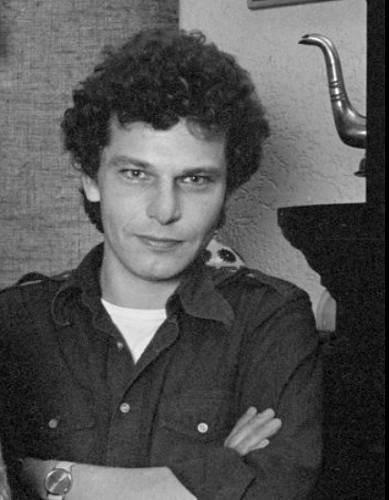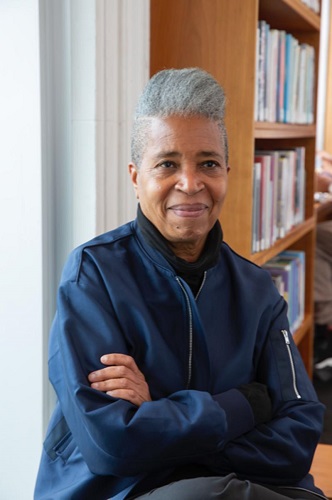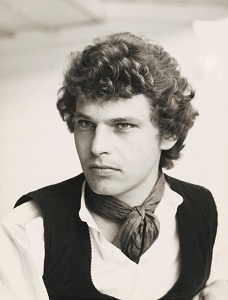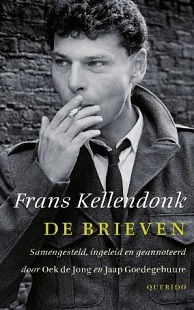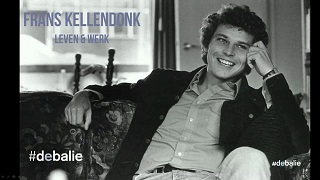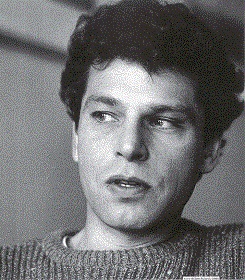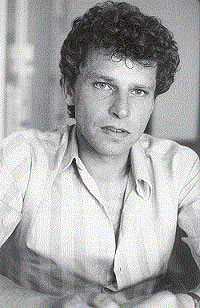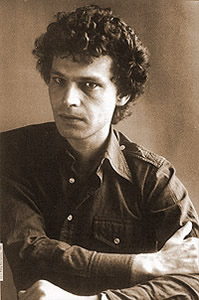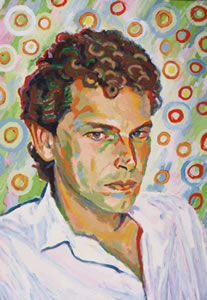De Nederlandse schrijver en vertaler Frans Kellendonk werd geboren in Nijmegen op 7 januari 1951. Zie ook alle tags voor Frans Kellendonk op dit blog.
Uit: De brieven
“Aan Johan Polak, 12 januari 1981
Beste Johan,
Bijgaand mijn verhaal ter ondersteuning van de subsidieaanvraag voor de uitgave van Henry James. Er staat, dacht ik, genoeg in — in elk geval zoveel als ik verzinnen kon zonder al te veel in details te treden. Het hopen is nu op een gunstige beslissing.
Vriendelijke groeten, ook aan Rik.
Frans Kellendonk
Ps Is er al overleg met Meulenhoff geweest over een evt. gezamenlijke uitgave van het boek? Ik wil zelf ook wel met Laurens gaan praten.
Appendix
Uitgeverij Polak & Van Gennep heeft het plan opgevat om een bundel te publiceren met de belangrijkste verhalen van Henry James. De Amerikaanse schrijver Henry James (1843-1916) wordt gerekend tot de grootste auteurs van de wereldliteratuur, maar in Nederland is hij tot op vandaag nagenoeg onbekend. Tientallen jaren geleden al zijn er vertalingen verschenen van The Aspern Papers’ (Een dichterlijke nalatenschap bij de Wereldbibliotheek), ‘The Turn of the Screw’ (In de greep, Salamanderreeks) en, meer recent, van de korte roman What Maisie Knew (Wat Maisie wist, in de reeks Prima Klassieken). Deze vertalingen kunnen niet eens adequaat genoemd worden en hebben nauwelijks iets bijgedragen tot een grotere bekendheid van het Nederlandse lezerspubliek met het werk van Henry James.
De voorgenomen bundel zal verhalen bevatten uit alle fasen van James’ schrijverschap en alle belangrijke thema’s van zijn romans zullen erin aan de orde komen. ‘Daisy Miller’ (1878) behandelt het ’transatlantische’ thema, dat James later op groter schaal heeft uitgewerkt in de roman The Portrait of a Lady: de ondergang van een puriteins, romantisch Amerikaans meisje in een corrupt, overgecultiveerd Europa. In The Aspern Papers’ (1888) vertelt James over de ongenaakbaarheid van het verleden en bovendien is dit het eerste verhaal waarin een zogenaamd onbetrouwbare verteller aan het woord is. ‘The Lesson of the Master’ (1888), ‘The Real Thing’ (1893) en The Figure in the Carpet’ (1896) hebben esthetische thema’s: die verhalen gaan over de verhouding van de kunstenaar tot zijn kunst, de verhouding van de kunstenaar tot het leven en van kunst tot het leven en over ‘het geheim’ van het kunstwerk, dat altijd aan de oppervlakte ligt. ‘The Pupil’ (1892) is weer een variatie op het thema van ‘Daisy Miller’, onschuld versus corruptie, de gaafheid van de jeugd die desintegreert wanneer ze in contact komt met de hopeloos gecompromitteerde ouderdom. Een dergelijke problematiek vinden we ook in wat wellicht het beroemdste spookverhaal van alle tijden is, The Turn of the Screw’ (1898). ‘In the Cage’ (uit datzelfde jaar 1898) ontleent, net als dat spookverhaal, zijn spanning aan het gezichtspunt van waaruit de gebeurtenissen verteld worden; hier gaat het om de fantasieën van een telegrafiste over de raadselachtige telegrammen die de rijkelui van Mayfair via haar versturen. ‘The Beast in the Jungle’ (1903), The Jolly Corner’ (1906) en ‘The Bench of Desolation’ (1910), drie verhalen die zijn geschreven in de complexe stijl van de late James, behandelen op heel verschillende manieren het thema van de grote roman The Ambassadors: een man ontdekt dat zijn leven heel anders had kunnen verlopen.”
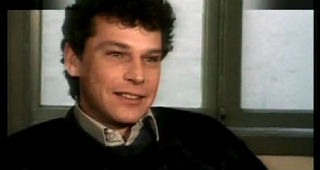
Frans Kellendonk (7 januari 1951 – 15 februari 1990)
De Amerikaanse dichter, redacteur en hoogleraar Reginald Gibbons werd geboren in Houston op 7 januari 1947. Zie ook alle tags voor Reginald Gibbons op dit blog.
Wildflowers
Coleridge carefully wrote down a whole page
of them, all beginning with the letter b.
Guidebooks preserve our knowledge
of their hues and shapes, their breeding.
Many poems have made delicate word-chimes—
like wind-chimes not for wind but for the breath of man—
out of their lovely names.
At the edge of the prairie in a cabin
when thunder comes closer to thump the roof hard
a few of them—in a corner, brittle in a dry jar
where a woman’s thoughtful hand left them to fade—
seem to blow with the announcing winds outside
as the rain begins to fall on all their supple kin
of all colors, under a sky of one color, or none.
At Noon
The thick-walled room’s cave-darkness,
cool in summer, soothes
by saying, This is the truth, not the taut
cicada-strummed daylight.
Rest here, out of the flame—the thick air’s
stirred by the fan’s four
slow-moving spoons; under the house the stone
has its feet in deep water.
Outside, even the sun god, dressed in this life
as a lizard, abruptly rises
on stiff legs and descends blasé toward the shadows.
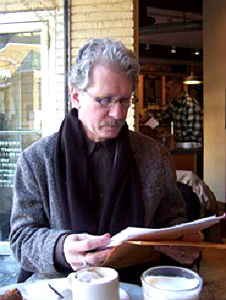
Reginald Gibbons (Houston, 7 januari 1947)
De Canadese dichteres en schrijfster Dionne Brand werd geboren op 7 januari 1953 op Trinidad. Zie ook alle tags voor Dionne Brand op dit blog.
Out here I am like someone without a sheet
Out here I am like someone without a sheet
without a branch but not even safe at sea,
without the relief of the sky or good graces of a door.
If I am peaceful in this discomfort, is not peace,
is getting used to harm. Is giving up, or misplacing
surfaces, the seam in grain, so standing
in a doorway I cannot summon up the yard,
familiar broken chair or rag of cloth on a blowing line,
I cannot smell smoke, something burning in a pit,
or gather air from far off or hear anyone calling.
The doorway cannot bell a sound, cannot repeat
what is outside. My eyes is not a mirror.
I saw this woman once in another poem
I saw this woman once in another poem, sitting,
throwing water over her head on the rind of a country
beach as she turned toward her century. Seeing her
no part of me was comfortable with itself. I envied her,
so old and set aside, a certain habit washed from her
eyes. I must have recognized her. I know I watched
her along the rim of the surf promising myself, an old
woman is free. In my nerves something there
unraveling, and she was a place to go, believe me,
against gales of masculinity but in that then, she was
masculine, old woman, old bird squinting at the
water’s wing above her head, swearing under her
breath. I had a mind that she would be graceful in me
and she might have been if I had not heard you
laughing in another tense and lifted my head from her
dry charm
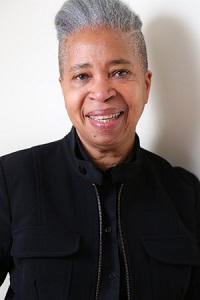
Dionne Brand (Trinidad, 7 januari 1953)
De Finse schrijfster Sofi Oksanen werd geboren in Jyväskylä op 7 januari 1977. Zie ook alle tags voor Sofi Oksanen op dit blog.
Uit: Norma (Vertaald door Sophie Kuiper)
“De taxi was er nog niet. Norma leunde tegen het hek van de begraafplaats en liet haar opluchting rondzwemmen in een bel van benzo’s en scopolamine. Ze had de begrafenis doorstaan. Ze had geen valsheid bespeurd in de condoleances, geen schijnheiligheid in empathisch bedoelde woorden. Ze was niet flauwgevallen, had niet overgegeven en was niet in paniek geraakt, ook al waren sommige aanwezigen dichtbij gekomen om haar te omhelzen. Ze had zich de perfecte dochter betoond en kon eindelijk haar zonnebril afzetten, die in de brandende zon langs haar bezwete neus omlaaggleed, maar net toen ze de bril in haar tas wilde stoppen, kwam een onbekende man zijn medeleven betuigen.
Norma schoof haar zonnebril weer op haar neus. Ze had geen behoefte aan gezelschap.
‘De anderen zijn geloof ik al naar binnen.’ Norma maakte een gebaar naar het restaurant waar het begrafenismaal plaatsvond en trok de rand van haar hoed omlaag. De man ging niet weg en stak zijn hand uit. Norma wendde zich af en negeerde het begroetingsgebaar, ze had geen zin in praatjes met vreemden. Maar de man gaf niet op. Hij pakte Norma’s hand vast.
‘Directeur Lambert,’ stelde hij zich voor. ‘Max Lambert. Een oude vriend van je moeder.’
‘Ik kan me niet herinneren dat ze het ooit over u heeft gehad.’ ‘Besprak u al úw vrienden met uw moeder?’ lachte de man. ‘Het is al lang geleden. In onze jonge jaren hebben Anita en ik heel wat meegemaakt.’
Norma trok haar hand los. De greep van de man om haar vingers voelde als een stempel dat tegen haar wil op haar huid werd gedrukt, en hij had over haar moeder gesproken in de verleden tijd. Dat klonk als een belediging. Norma was nog niet in dat staNorma dium en de man zag er niet uit als een vriend van haar moeder. Norma en Anita Ross hadden een teruggetrokken leven geleid, sociale activiteiten waren beperkt geweest tot werkverplichtingen. Ze kenden elkaars bescheiden kennissenkring. Deze man hoorde daar niet bij.
De man had zijn haar naar achteren gekamd, aan de diepte van zijn inhammen was zijn leeftijd niet af te lezen, wat niet gezegd kon worden van zijn huid. Zijn rimpels waren diepe groeven van de zon, zijn wallen zwaar van langdurig en overvloedig alcoholgebruik en zijn gebruinde kleur kon de gesprongen adertjes niet verhullen.”
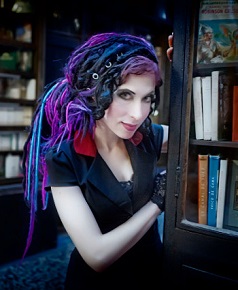
Sofi Oksanen (Jyväskylä, 7 januari 1977)
De Nederlandse dichter, bloemlezer Henk van Zuiden werd geboren in Apeldoorn op 7 januari 1951. Zie ook alle tags voor Henk van Zuiden op dit blog.
Had je anders gedacht?
Voor melieve
Zelfs niet bij uitzondering,
de arm die ik om je schouders sla, de deur die ik voor
je open houd, lieve of gekke woorden die ik je bedenk,
de muziek waarmee ik je oren verwen, een bergwan-
deling die je voert naar een klein welhaast vergeten
oord waar tijd bijzaak is.
Ik deed en doe het voor je omdat je mij zo lief bent,
en nooit ingegeven om wat toeval wordt genoemd. En
nooit gedaan uit vanzelfsprekendheid. Dat ken ik niet,
daar zijn wij beiden vreemd mee. Het nieuwe gerecht
dat ik op tafel tover, de Zwitserse puurste chocolade
die ik tevoorschijn haal, een nog niet eerder gehoord
sprookje vertel, een grap die ik maak, oudroze rozen
die geurend Rilkegedichten oproepen in de theetuin
van Bern. Niets was en is gedaan uit vanzelfsprekend-
heid, niets uit toeval, zelfs niet bij uitzondering.
Ik deed en doe het louter voor jou, kom maar thuis
melieve, het hout brandt in de haard,
om je lijf te warmen en tegen alle vormen van kou-
Met de paarden of achterop de motor
Voor Annabel Sprengen
Dag Annabel, ik heb je gezocht.
Naar vrienden, naar wat jou boeide.
Daar is geen antwoord op gevonden.
Ik kan het niet verbeelden, bereikte
geen van de vertrekpunten waar jij
eens begon te zoeken naar aards-
vergeten beleven met hulpmidde-
len die je niet meer loslieten.
Of, was het andersom?
Het opperst genieten, het vervagen
van de wereld waar jij op leefde,
duurde telkens kort. Te kort. Weer
en meer wilde je het terughalen, dat
eeuwig verlangen is nu vervlucht.
Je lichaam had je al vroeg geoefend
in ’n houding om terug te keren naar
moederschoot. Buiten stonden de
paarden van Elijah en de motor
van je vader. Vrienden van je heb
ik niet gevonden, niemand zag hoe
jij vertrok.
Het is een lange trip geworden.
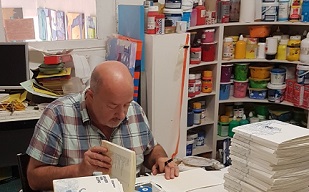
Henk van Zuiden (Apeldoorn, 7 januari 1951)
De Indiase schrijfster en columniste Shobhaa Dé werd geboren op 7 januari 1947 in Maharashtra. Zie ook alle tags voor Shobhaa Dé op dit blog.
Uit: Starry Nights
“Aasha Rani hadn’t bothered to show up for the preview. She wasn’t expected to. In any case, she now had a small theatre attached to her swanky Bandra bungalow. Plus a dubbing studio. Good business sense, Kishenbhai mused. Who was her guru? Whoever it was had got her to part with her precious money. Kishenbhai laughed silently at the image his mind suddenly conjured up: `Aasha Rani, darling, part your legs, you can part with the money later.’ She deserved whoever it was. She deserved what he was doing to her. Scheming bitch! Chalo chhodo, all women are the same. All filmi women, at least. No exceptions. Not one. When Kishenbhai discovered Aasha Rani she had been nothing. A dhool ka phool’ the film rags gleefully dismissed her. An awkward, ungainly, overweight girl from Madras. And so dark. Chhee! Kishenbhai didn’t like dark girls. He’d always gone for ‘cloodh-ke-jaisi-gori’ women himself. His own swarthy complexion was worked over with Afghan Snow and Pond’s Dreamflower talc, a part of his daily, post-bath ritual. Aasha Rani had laughed and laughed when she’d found him at his careful toilette. But that was later. After she had officially become his. No, he hadn’t married the bitch or anything. But it was known in their circle that Kishenbhai had got hold of a new chidiya. It was a signal to all others to keep their paws off. But Gopal had deliberately chosen to ignore the commandment. Gopal had always felt one-up on Kishenbhai. Because Gopal was from Himachal Pradesh. Very fair, and with light eyes. Anyway, here she was now. Beautiful sequence. Well shot. Aasha Rani was very finicky about the opening shot. Yes, Aasha Rani had certainly learnt all the tricks. She knew her face better than anybody else. She knew she had a difficult nose. And a heavy chin. But she also knew that once her eyes were the focus and her lips properly pouted, nobody bothered about anything else. Kishenbhai searched the image on the screen and found the mole above her lips. She used to hate it in those days. Wikaldo na,’ she’d plead with her make-up man. It was Kishenbhai who had convinced her that the mole looked very sexy. That it drew attention to her mouth. These days she darkened it. He tried to stop thinking about old times and to concentrate on the song she was moving her lips to. Still the same Aasha Rani—terrified to open her mouth too wide lest her crooked dog-teeth showed up on the screen. Soft focus lens, a back lit shot, three-quarter profile—everything just the way she wanted. He let the words of the song engulf him Nothing special—though the soundtrack had a minute or so of suggestive panting. The visual had her in a jacuzzi, one slim leg sticking out. It was supposed to be a fantasy sequence in which the heroine dreamed of her wedding night. Aasha Rani had really let herself go for this one. He watched as she caressed herself with a cake of soap.”
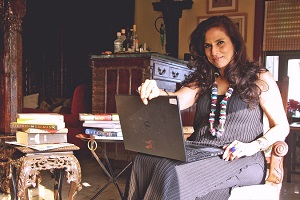
Shobhaa Dé (Maharashtra, 7 januari 1947)
De Franse schrijfster Marie Desplechin werd geboren op 7 januari 1959 in Roubaix. Zie ook alle tags voor Marie Desplechin op dit blog.
Uit: Mauve
“Nous étions assises sur un banc, face à l’entrée du bâtiment D, et nous regardions les gosses partir pour l’école. Euphronie avait eu la bonne idée de préparer un thermos de café. Depuis plus d’une heure que nous attendions, j’en avais bu un demi-litre, et mes nerfs étaient dans un drôle d’état. Ma voisine avait une allure étrange dans son tablier fleuri, qui lui faisait comme une housse multicolore. Elle ressemblait à un fauteuil.
Nous avions jugé prudent de nous conformer aux habitudes vestimentaires du quartier. L’affaire n’avait pas été facile. Je ne trouvais rien d’assez normal à mon goût avant de tomber sur un vieux survêtement que j’avait porté à l’hôpital à l’époque de mon opération du genou. Il était mou et informe. J’étais moche mais Euphronie était encore plus moche que moi. Il y a des gens à qui la normalité ne va pas.
Les gamins sortaient de l’immeuble comme des souris de sous un tas de bûches. Les premiers à quitter leurs appartements étaient les collégiens qui commencent leurs journées à huit heures, tôt, très tôt, bien trop tôt à mon goût. Ils avaient des figures d’endives. Si ça n’avait tenu qu’à moi, tout ce petit monde aurait dormi deux heures de plus, ce qui n’aurait pas empêché la terre de tourner. Après eux, nous avons vu trottiner les petits bouts qui fréquentaient encore l’école primaire, ouverture à huit heures et demie. Ils n’avaient pas l’air en meilleur état, farcis de céréales trop sucrées , fripés de sommeil et pas lavés pour la plupart d’entre eux, j’en aurais mis ma main à couper. C’était maintenant le tour de ceux dont les cours ne débutent qu’à neuf heures. Ca n’en finirait donc jamais ? Après ce que j’avais bu, le parfum du café me levait le coeur. »
(…)
Derrière un petit groupe d’enfants qui bavardaient en traînant leurs cartables, une gamine marchait lentement. Ses longs cheveux soigneusement peignés se tordaient en boucles à leurs extrémités. Elle se tenait très droite, ce qui donnait à sa façon de marcher quelque chose de particulier. Les enfants ont le corps souple et plein de vie. Courir, sauter, se balancer, voilà ce qu’ils veulent. Mais cette petite personne marchait toute raide dans son manteau, à l’écart des rires et des conversations. Elle ressemblait à un soldat minuscule casqué de cheveux. Le plus frappant était son regard, qui restait fixe et comme posé dans le vide. Ce n’est pas qu’elle était mal à l’aise, grave ou inquiète comme le sont certains enfants. C’est qu’elle se tenait en dehors d’un monde qui n’était pas assez bien pour elle.”
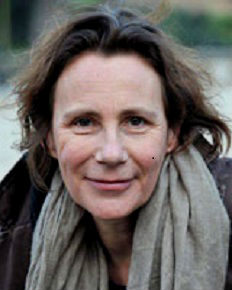
Marie Desplechin (Roubaix, 7 januari 1959)
De Amerikaanse schrijver Nicholson Baker werd geboren op 7 januari 1957 in Rochester.Zie ook alle tags voor Nicholson Baker op dit blog.
Uit:Traveling Sprinkler
“I’m parked on Inigo Road, which is my favorite road anywhere. I wish I could write about the phrase “happy phrase,” but there’s no time. Very soon I’m going to be Fifty Fucking Five. The three Fs. The last time I hit three Fs was ten years ago, and this time is definitely worse. Unless you’re Yeats or Merwin you are done as a poet at fifty-five. Dylan Thomas was in the ground for sixteen years at fifty-five. Keats was dead at, what, twenty-six? Riding on horseback with his sad lungs coughing blood. And as for Wilfred Owen.
The first time I read Keats’s sonnet “When I Have Fears,” I was eating a tuna sub. I was an applied music major, with a concentration in bassoon. I’d found the poem in The Norton Anthology of Poetry—the shorter black edition with the Blake watercolor of a griffin on the cover. I propped the Norton open with my brown plastic food tray and I started reading and eating the tuna sub and drinking V8 juice occasionally from a little can.
Keats says: “When I have fears that I may cease to be.” He doesn’t say, “When I have fears that I may,” you know, “drop dead,” or “breathe my last”—no, it’s “cease to be.” I stopped chewing. I was caught by the emptiness and ungraspability in that phrase. And then came the next line, and I made a little hum of amazement: “When I have fears that I may cease to be,” Keats says, “Before my pen has gleaned my teeming brain.”
I don’t want to pretend that the cafeteria spun around. It stayed still. I heard the grinding sound of the cash register printing. But I was thinking very hard. I was thinking about a large tortoiseshell that somebody had given me when I was small. There was a sort of fused backbone on the inside of it that ran down the middle. This bony ridge smelled terrible when you sniffed it close-up, although it had no odor from a normal distance. I imagined the tortoiseshell as the top dome of a human skull, and I imagined Keats’s pen gleaning bits of thought flesh from it.”

Nicholson Baker (Rochester, 7 januari 1957)
De Amerikaanse dichter, librettist en vertaler Chester Simon Kallman werd geboren op 7 januari 1921 in Brooklyn, New York. Zie ook alle tags voor Chester Kallman op dit blog.
The Souvenir
Evening. Who calls? The light
Is walking on the waves; the light retreats.
A word advances and repeats:
Or time or tide or night.
There was no victory
To speak about: a star that fell, a look
Contracted to a choice. I took
The sea-shell for the sea.
Like As Not
If you don’t believe my assertion
That when a sky-blue plate from Sweden
Yesterday was broken
A beam fractured from the universe,
And aren’t convinced again
With me how things always get worse,
You’ll convict me there and then—
‘A lover of perfection.’
But I’m not such a baby
Nor by any means that gloomy,
In fact I’d be happy
To show you a left finger-tip gone dead
Which is wronged sympathy,
And a scar proving I bled
When progress operated out of me
The Twenty-third Street Ferry.
Do stars weep into my pillow?
Excess of laughter, not sorrow
At the exhausted meadow
Reviving each night less beneath its cover
Of engine-sooted snow.
Why if anything I’m a lover.
Of what’s frankly imperfect: I know
Myself in my echo.
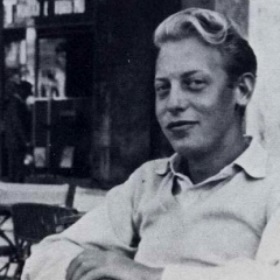
Chester Kallman (7 januari 1921 – 18 januari 1975)
Zie voor nog meer schrijvers van de 7e januari ook mijn blog van 7 januari 2018 deel 1 en eveneens deel 2.
